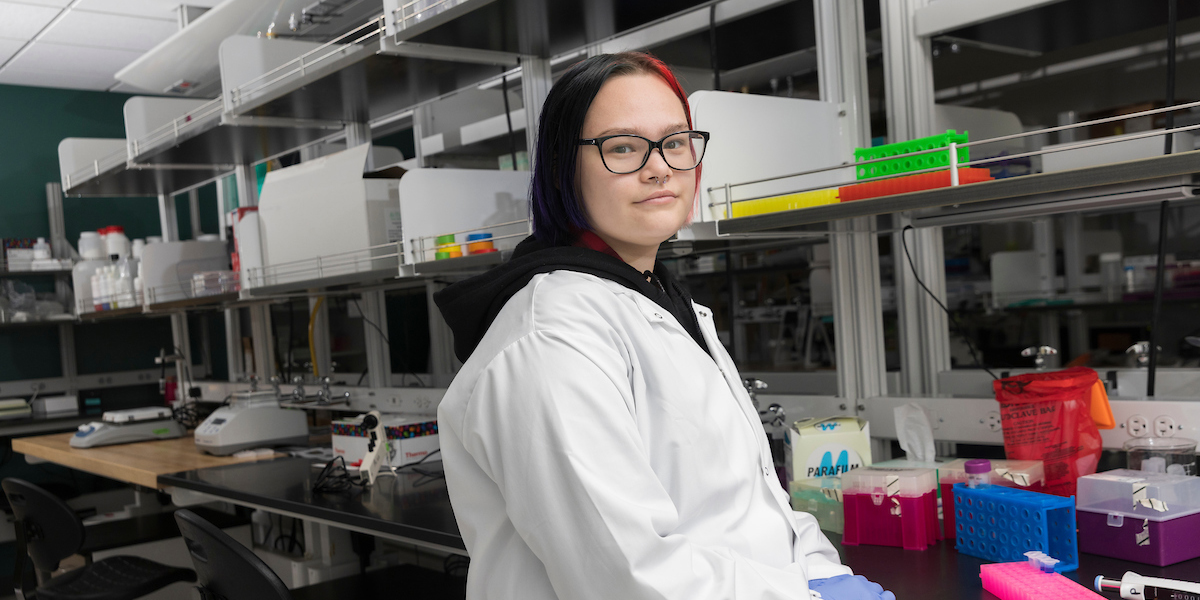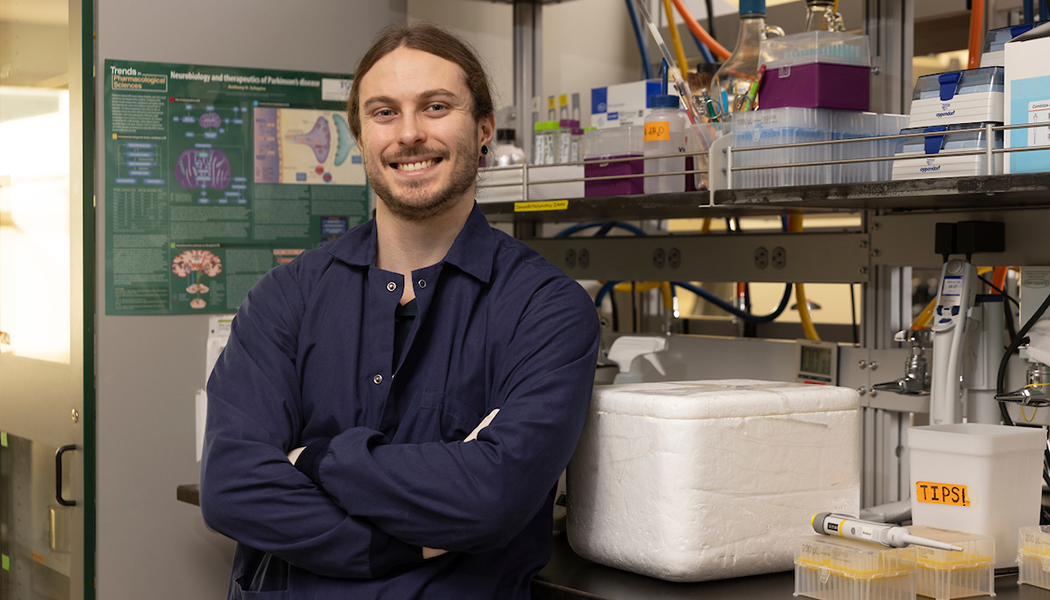Master and PhD programs in pharmaceutical sciences underway
Hands-on learning develops new researchers

When Binghamton University’s School of Pharmacy and Pharmaceutical Sciences (SOPPS) was established in 2017, the only degree program it offered was the Doctor of Pharmacy. But the vision was to add master’s and doctoral programs in pharmaceutical sciences, and those programs launched in fall 2022.
“Launching these programs was a priority for SOPPS,” said Dean Kanneboyina Nagarau. “The MS and PhD programs in pharmaceutical sciences are key to the research mission of both SOPPS and Binghamton University.”
The approval process for advanced-degree programs is demanding. Not only do they require campus approval, but they must also be approved by the New York State Education Department and SUNY system administration.
“We started at pretty much the same time we enrolled our first PharmD class,” says Nathan Tumey, associate professor of pharmaceutical sciences and assistant graduate director. “About five years ago we started putting all of the required documents for the Master of Science (MS) and PhD programs together in earnest.”
Now with 15 students between the two programs — eight MS and seven PhD students — the first-year targets were met, says Yetrib Hathout, professor of pharmaceutical sciences and graduate director. “We want to keep our classes small, especially for the master’s students, because they have hands-on classes and labs and this kind of one-on-one work will help get them job-ready.”
Madison King came all the way from North Dakota to start her PhD program in pharmaceutical sciences at Binghamton. It might be a bit warmer here in the winter than her 20 degrees below zero native state, but what attracted her to Binghamton is the cutting-edge equipment, the faculty and the building.
“I was looking at programs online and saw you were just starting your first batch of students, and that’s interesting to me,” King says. “The way I designed my undergraduate degree, I did a lot of pharmaceutical sciences lab research, so I knew what I was getting into. Then I came out here and met with a lot of faculty and thought, ‘This is really awesome.’ They all emphasized that they care about students and I didn’t get that anywhere else — and the building is new so the air conditioning won’t go out and let my cells get contaminated!”
King hopes to one day work in gene therapy. “I have a family member who has a genetic disease and she was put on a gene therapy and it completely changed her life,” King says. “I want to be able to give that to other people. That’s my ultimate goal.”
MS student Michael Coyle also has a specific goal. As an undergraduate at Binghamton, he began working in the lab of Christopher Bishop, professor of psychology. Following his graduation in 2019 with a bachelor’s degree in integrative neuroscience, Coyle continued working in Bishop’s lab, researching potential therapeutics to ease Parkinson’s disease symptoms.
Bishop established a company, Neuralina Therapeutics, and has developed a candidate drug for Parkinson’s disease. Coyle chose the path to an MS to become more educated about the later side of drug development — something that will help him as he continues working with Bishop and Neuralina.
Already, Coyle is putting what he is learning in the MS program to use in the Bishop lab. “Everything we’re studying in class is immediately relating to the drugs we’re working on or the experiments we need to do,” he said .”Everything we have discussed I’ve tagged to the drugs we’re working on to get a better idea of exactly what they are.”
The hands-on lab experience Coyle and King are experiencing differentiates Binghamton’s program from those at other schools, Tumey says. “A core component of the MS is a class designed to provide hands-on experience in instrumental analysis. Students will learn how to use the instrumentation, rather than just learn about it in the classroom.”
Having undergraduate research experience at Binghamton has also helped feed the programs. There are currently three master’s students, including Coyle, and one PhD student who fall into this category. “Exposing students to research at the undergraduate level is an important step in their career path,” Hathout said. “Undergraduates sometimes don’t know what they want to do, so when we show them that this is an interesting area of research and a viable career path, we feel really proud of that.”
And what Coyle is learning now will set him up for career success, said Tumey. “Within the pharmaceutical industry there are a lot of openings for MS degree students. The job market is pretty hot for people coming in….most of those with bachelor’s don’t have a lot of hands-on experience but our MS students will have this instrumental analysis course along with a research-based internship so they will come out with some practical skills that are in high demand in pharmaceutical and biotechnology companies.
“And, of course, our PhD students will also get plenty of hands-on experience,” he adds, beginning with rotations through three different labs where they learn about a particular faculty member’s research and the technology used. “The rotation experience is a bit like a dating relationship — the professor and student are looking for a good fit before making a 4-year commitment to an advisor.”
Following their third rotation, they are matched with an advisor that is the best fit based on feedback from both the students and the advisors.
“One reason we think this process is attractive for students is that choosing a PhD advisor is one of the most monumental decisions students will make in their entire life,” Tumey says. “A good match can launch a career and fuel years of exciting research. But a poor match can make for a very difficult four years of life.”
“And we’re here to mentor students,” he added. “We’re eager to mentor because that’s how we do what we love. PhD students are the engine that keeps scientific enterprise going. Lab rotations increase faculty workload, but the outcome is worth the investment.”
Another distinguishing part of the MS and PhD programs is flexibility between labs, says Hathout. “When a student works in one of our labs, there is no border between the different labs. A student in Tumey’s lab can learn from others, and that’s very important. There are no silos. We don’t have any borders and students can be mentored by several advisors.”
The first two years of the PhD program is when the students are taught to fly on their own, Hathout explained. “Then they start thinking and designing experiments and reading the literature. We try to teach them to critically think and become independent researchers.”
One additional thing that sets this department apart from other pharmaceutical sciences programs is some of the industrial connections and collaborations that we have, Tumey said. “There are multiple professors here who came out of the pharmaceutical industry and are active consultants at companies, members of scientific advisory boards or are even involved in managing companies,” he said. “That’s useful for two reasons: First, it keeps what we are teaching relevant and practical. Secondly, since many of us are actively connected to the private sector, we have multitudes of connections that can assist with internships, jobs and funding. In fact, some of our courses bring in guest lecturers from these companies to teach various aspects of drug discovery and regulatory affairs.”
Placement success is already a hallmark for students who have conducted research with SOPPS faculty, and that success is expected to continue, whether for internships or jobs. Graduates coming out of the Binghamton pharmsci labs have landed jobs at companies including Regeneron, Genmab and Nektar Therapeutics.
“One additional feature of our program is its close affiliation with the PharmD program. Because of this relationship, our students are exposed to clinical faculty and they serve as teaching assistants in pharmacy classes. This means that they are seeing the continuum from drug discovery all the way to patient care,” Tumey says, which can be attractive to agencies in both the public and private sector looking to hire. “Many of these organizations hire people with the sort of expertise we are developing in these students. Bachelor’s degrees won’t get you that. A specialized pharmaceutical background is essential.”

